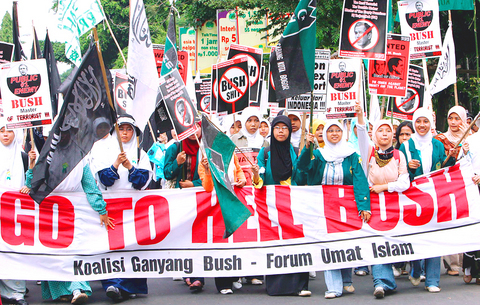US President George W. Bush's unpopularity in the world's most populous Muslim nation made security jitters and angry protests the hallmarks of yesterday's six-hour trip to court Indonesian favor.
Through sheets of sometimes heavy rain, Bush flew by helicopter from the capital of Jakarta to this lush hilltop suburb for talks with Indonesian President Susilo Bambang Yudhoyono. Bush, and his wife, Laura, smiled as they strolled up the red-carpeted steps of Bogor Palace, a graceful presidential retreat on vast grounds, signing a guest book and heading inside for the day's events.
"I admire Indonesia's pluralism and its diversity," Bush said, opening a discussion with moderate civic leaders. "It's very important for the people of America to understand that this vast country has got tremendous potential, but it's got a prominent role to play in the world in showing how it's possible for people to be able to live together in peace and harmony."

PHOTO: EPA
From the Bush-Yudhoyono meeting and joint press availability to round-table discussions and a state dinner, Bush was not interacting with the general populace or doing anything outside the palace confines.
Braced for the local reaction to the visit, thousands of police and rifle-toting soldiers patrolled Bogor's streets, jammed mobile phone signals and deployed water cannons.
Demonstrations by Islamic hardliners, students, housewives and taxi drivers alike have been staged every day this month. Thousands more marched yesterday, carrying posters showing victims of violence in Iraq.
Anti-Bush protesters tried to seal off US-owned restaurants in two Indonesian cities, witnesses said, and demonstrations were held in at least 10 cities.
For Bush, the risks of the trip appear to be worth it to bolster Yudhoyono's anti-terror cooperation, celebrate the country's democratic advances and try to dent anti-US sentiment.
With many Muslims around the world regarding his foreign policies as an affront to their faith, Bush also was eager to be seen soliciting Yudhoyono's advice about the Israeli-Palestinian dispute, the North Korean and Iranian nuclear standoffs and other world affairs.
Bush was expected to highlight America's quick dispatch of aid after the December 2004 tsunami that left 131,000 dead, 37,000 missing and 570,000 homeless in Indonesia alone -- and after a devastating earthquake in Pakistan in October last year.
He often speaks of both efforts as proof that the US can be a compassionate friend to Muslim nations.

SECURITY: As China is ‘reshaping’ Hong Kong’s population, Taiwan must raise the eligibility threshold for applications from Hong Kongers, Chiu Chui-cheng said When Hong Kong and Macau citizens apply for residency in Taiwan, it would be under a new category that includes a “national security observation period,” Mainland Affairs Council (MAC) Minister Chiu Chui-cheng (邱垂正) said yesterday. President William Lai (賴清德) on March 13 announced 17 strategies to counter China’s aggression toward Taiwan, including incorporating national security considerations into the review process for residency applications from Hong Kong and Macau citizens. The situation in Hong Kong is constantly changing, Chiu said to media yesterday on the sidelines of the Taipei Technology Run hosted by the Taipei Neihu Technology Park Development Association. With

CARROT AND STICK: While unrelenting in its military threats, China attracted nearly 40,000 Taiwanese to over 400 business events last year Nearly 40,000 Taiwanese last year joined industry events in China, such as conferences and trade fairs, supported by the Chinese government, a study showed yesterday, as Beijing ramps up a charm offensive toward Taipei alongside military pressure. China has long taken a carrot-and-stick approach to Taiwan, threatening it with the prospect of military action while reaching out to those it believes are amenable to Beijing’s point of view. Taiwanese security officials are wary of what they see as Beijing’s influence campaigns to sway public opinion after Taipei and Beijing gradually resumed travel links halted by the COVID-19 pandemic, but the scale of

A US Marine Corps regiment equipped with Naval Strike Missiles (NSM) is set to participate in the upcoming Balikatan 25 exercise in the Luzon Strait, marking the system’s first-ever deployment in the Philippines. US and Philippine officials have separately confirmed that the Navy Marine Expeditionary Ship Interdiction System (NMESIS) — the mobile launch platform for the Naval Strike Missile — would take part in the joint exercise. The missiles are being deployed to “a strategic first island chain chokepoint” in the waters between Taiwan proper and the Philippines, US-based Naval News reported. “The Luzon Strait and Bashi Channel represent a critical access

Pope Francis is be laid to rest on Saturday after lying in state for three days in St Peter’s Basilica, where the faithful are expected to flock to pay their respects to history’s first Latin American pontiff. The cardinals met yesterday in the Vatican’s synod hall to chart the next steps before a conclave begins to choose Francis’ successor, as condolences poured in from around the world. According to current norms, the conclave must begin between May 5 and 10. The cardinals set the funeral for Saturday at 10am in St Peter’s Square, to be celebrated by the dean of the College